Antlia Sulfur II (SII) 4.5nm EDGE 1.25" Filter (ANT-SII-45NM-EDGE-125)
ANT-SII-45NM-EDGE-125


Antlia Sulfur II (SII) 4.5nm EDGE 1.25" Filter (ANT-SII-45NM-EDGE-125)
ANT-SII-45NM-EDGE-125
Products in the Same Family
$190 4.5nm SII 2" EDGE
$298 4.5nm SII 31mm EDGE
$200 4.5nm SII 36mm EDGE
$231 4.5nm SII 50mm EDGE
$359 4.5nm Ha 1.25" EDGE
$190 4.5nm Ha 2" EDGE
$298 4.5nm Ha 31mm EDGE
$200 4.5nm Ha 36mm EDGE
$231 4.5nm Ha 50mm EDGE
$359 4.5nm OIII 1.25" EDGE
$190 4.5nm OIII 2" EDGE
$298 4.5nm OIII 31mm EDGE
$200 4.5nm OIII 36mm EDGE
$231 4.5nm OIII 50mm EDGE
$359
Why Purchase from All-Star Telescope?
Free Expert Support
Whether you are a first timer needing help with setting up or an enthusiast that can't quite make that one thing work, our expert staff are ready to support your needs. With decades of knowledge and first hand experience we've been there and we can help you through it!
Stress Free, Secure Transactions
You can trust purchasing and delivery with All-Star Telescope. All of our transactions are 100% secure and Level 1 PCI DSS compliant thanks to Shopify's ShopPay platform. For additional protection, we insure 100% of the value of every shipment we make. If it get's lost during shipment, we replace it. If it gets damaged during shipment, we replace it. We make sure your product arrives exactly as you would expect it to; we promise.
We also ensure privacy protection. We never keep any of your credit card information on file and any of your personal data is stored according to our policies.
30 Day Return Policy
Buy with confidence knowing that we accept returns up to 30 days after purchase. We want you to have something you will actually use and we are confident that we keep good quality products in our store with No Junk.
Price Match Promise
Shipping around for the best price is tough, we make it easier by offering the best pricing in the market. But if you find a better price on an in-store item somewhere else we will match it!
Product Description
Antlia H-alpha EDGE narrowband filter optimizes the FWHM (full width half maximum) to 4.5nm bandpass. The suppression of optical density (OD) 5 on unwanted wavelengths and the excellent transmittance characteristics found in the Antlia 3nm Pro series has been incorporated into the 4.5nm EDGE narrowband filters. The result is that these filters deliver superior SNR (signal to noise ratio) and better contrast in your images.
Conventional broader narrowband filters cause a heavy loss in transmission due to the strong Center Wavelength (CWL)-shift. We guarantee T>90% within 1nm range of the center bandwidth, which means that the H-alpha 4.5nm EDGE narrowband filters can guarantee high transmittance for working with both long focal ratios and fast optical systems. Blue-shift data shows that Antlia 4.5nm EDGE filters can be used with nearly all systems as fast as f/3 with minimal loss in emission signal and meets the requirements of fast optics.
Main Features
- High transmittance and narrow bandwidth to maximize contrast
- Steep spectral profile minimizes halos around bright stars
- A single substrate to eliminate internal reflections
- Use in light polluted areas and dark sites
- Extends imaging time when the moon is up
- Antlia narrowband EDGE filters can be used down to f/3 systems with minimal loss of signal
- All Antlia unmounted filters are edge blackened to eliminate internal reflections from stray light
- Superior optical reliability reduces post image processing
- This filter is only effective for deep sky objects that contain SII/Ha/OIII emissions
Specifications
| Model | Sulfur II | Hydrogen-Alpha | Oxygen III |
| FWHM | 4.5nm | 4.5nm | 4.5nm |
| CWL (Central Wavelength) | 671.6nm | 656.3nm | 500.7nm |
| Peak Transmission | >90% | >90% | >85% |
| Blocking | ≥OD5 @ 300-1000nm | ≥OD5 @ 300-1000nm | ≥OD5 @ 300-1000nm |
| Filter Thickness | 2mm+/-0.05mm (1.25"/2"/31mm/36mm) 3mm+/-0.05mm (50mm/50x50mm) |
2mm+/-0.05mm (1.25"/2"/31mm/36mm) 3mm+/-0.05mm (50mm/50x50mm) |
2mm+/-0.05mm (1.25"/2"/31mm/36mm) 3mm+/-0.05mm (50mm/50x50mm) |

Additional Articles, Videos, and Links
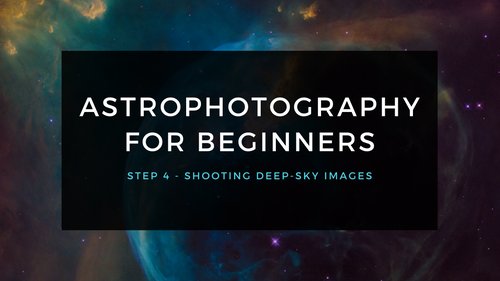
Astrophotography for Beginners Step 4: Shooting Deep-Sky Images
Taking deep sky pictures can be daunting, luckily there is an easy process to follow to allow you to get great shots! Here is the typical process for actually taking deep-sky images in the field.
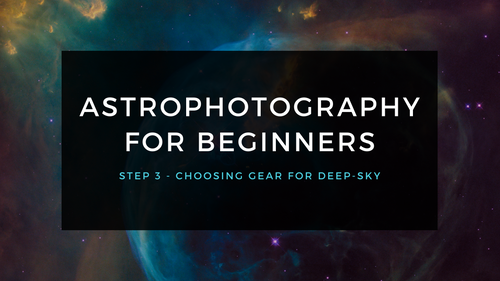
Astrophotography for Beginners Step 3: Choosing Gear for Deep-Sky Imaging
Using a star tracker gains you experience with the fundamentals of deep-sky imaging. Shooting the Moon gains you experience focusing and framing through your telescope. Through your sessions you’ll...
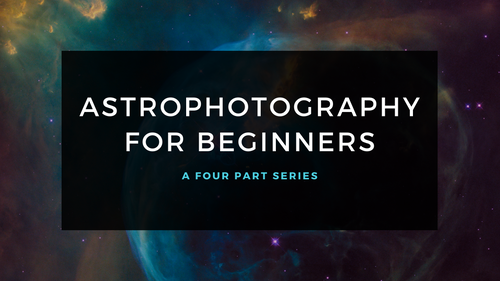
Astrophotography for Beginners - Start Here: Getting into Astrophotography Step by Step
Shooting the night sky has never been more popular, nor easier. The choice of equipment has also never been better, or more affordable. However, as per the advice given by Dickinson and Dyer in the...
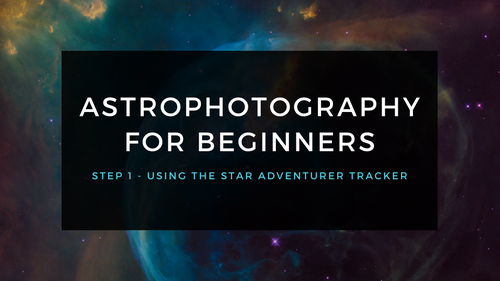
Astrophotography for Beginners Step 1: Using the Star Adventurer Tracker
By far the most economical and easiest way to capture beautiful images of the Milky Way and large deep-sky objects like the Andromeda Galaxy (shown here) is to use a star tracker. Here are steps an...
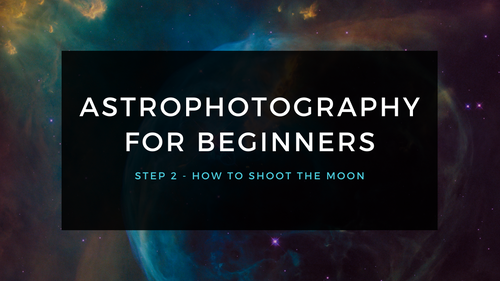
Astrophotography for Beginners Step 2: How to Shoot the Moon
Close-ups of the Moon are rewarding, and an easy way to learn to shoot through your telescope. While good results are possible with a phone camera clamped to an eyepiece (as shown below), this tuto...

